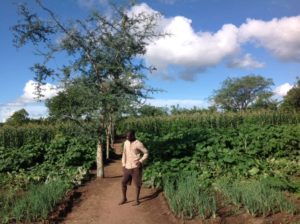According to figures availed by the Zimbabwean government, more than 4.5 million people were food insecure in 2016, with the number expected to go up as farmers approach the next harvest this year.
Though most parts of the country have received good rainfall this season, many small scale farmers did not have farming inputs and tillage power.
The shortage of farming inputs coupled with lack of tillage power has resulted in many farmers reducing their hectarage under crops.
However, in Hurungwe district, Mashonaland West, small scale farmers mostly, women who benefited from nutritional community gardens spearheaded by a private company, Carbon Green Africa, are expecting bumper harvests this season.
The nutritional community gardens are part of the the Kariba REDD+ which started in 2011 and running concurrently with various other projects in four districts in the province.
The other projects include road development, borehole refurbishment, conservation farming and tree nurseries, among others.
More than 15 nutritional community gardens have been established in these four districts in Mashonaland West province after necessary trainings.
The nutritional gardens improve household nutrition and enhanced a healthy life.
Jenifer Nyangumbe of Village 27A in Hurungwe district said the gardens had improved nutrition at household level in the area.
“As you can see, Iam very healthy, so are our children,†Nyangumbe said with a smile.
She is running the community garden with 31 other women and each woman has a one acre piece of land.
“Our aim is to enhance nutrition at household level and most the food we produce is for consumption but we still sell some. At the end of each harvest each women can get more than $300 from the sale of our produce,†Nyangumbe said.
Carbon Green Africa was established to facilitate the generation of carbon credits through setting up REDD+ projects.
The company’s competency is having the capability to enable successful conservation projects according to the rules of the Verified Carbon Standard and the Community, Climate and Biodiversity Standard.
And according to the website Climate Friendly the project has prevented emissions of upto 5.5million tonnes of carbon dioxide per year.
The United Nations created the REDD+ mechanism to quantify and value the carbon storage services that forests provide by making forests more valuable standing than cut down, coderedd.org said.
REDD+ provides forest communities and developing countries with a new, sustainable, low-carbon pathway to economic growth.
Chief Chundu, who is a traditional leader in Hurungwe hailed the community nutritional garden as a practical way to enhance food security and nutrition at household level.
“Iam happy with the projects being run here,†Chief Chundu said.
He said he invited Carbon Green Africa senior officials to a local meeting with his people to clear some issues around the projects.
During the meeting, local farmers called on Carbon Green Africa to expand the projects to other areas.
“We want more community gardens here,†Hurungwe district Ward 7 councilor, Jealous Matesanwa said. “We also want more boreholesâ€.
But Carbon Green Africa CEO, Charles Ndondo said it was important to expand the Kariba REDD+ project but his company was hamstrung by the shortage of funds.
“We have little money,†Ndondo said.
Ndondo said the project was now expected to be running from proceeds of the carbon credit sales.
“The major challenge is on the slow uptake of the credits on the voluntary market. These community projects are operating at below level due to limited sales of the carbon credits and more projects are on cards awaiting sales,†he said.
Even with the limited resources, the project has proved to be successful in reducing deforestation in the project area thereby saving thousands of forest land.
With, regards to community benefits, Ndondo said the project includes a wide range of activities, which have direct positive effects on communities.
Since inception in 2011, every year 1 200 Farmers are trained on conservation agriculture where necessary material inputs are provided and to date over 6 000 farmers have benefited.
Over 700 Kenyan Top bar bee hives have been distributed to community members after trainings and more 200 boreholes have been resuscitated so as to provide clean water.
Schools and clinics have been supplied with infrastructure development and disadvantaged children have had their school fees paid for, he said.
Moringa tree plantations have been set up and more herbal trees can be set up subject to funds availability.
The project’s biodiversity benefits include a reduction of the poaching on wildlife through regular patrolling, in cooperation with the local rural district councils.
This story was written under the aegis of the CSE Global Media Fellowship Programme.
Post published in: Featured


